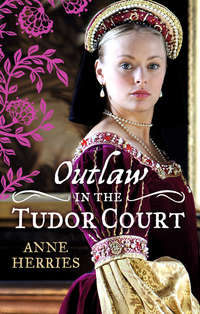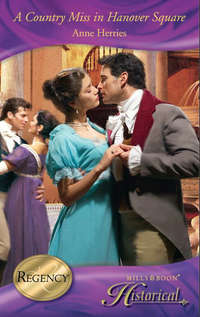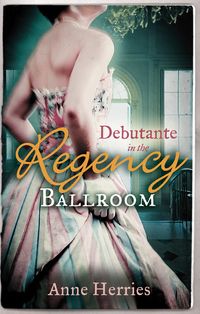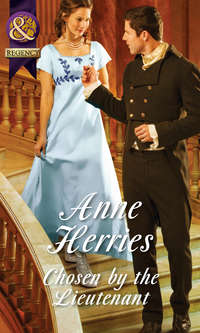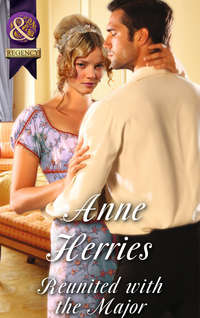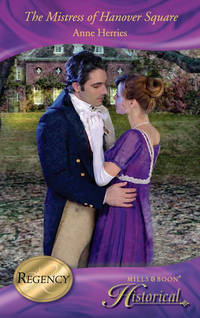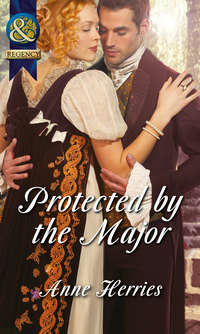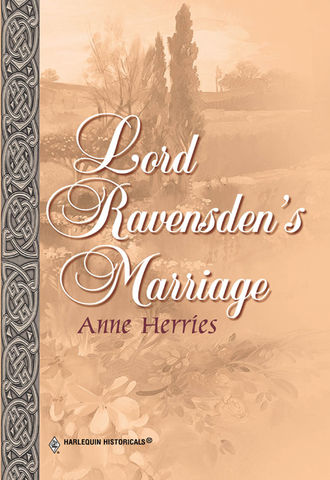
Полная версия
Lord Ravensden's Marriage
Harry cursed the misfortune that had taken him from town. He had been summoned urgently to his estates in the north, a journey there and back of several days. Had he been in London, he might have seen Olivia, explained that he did indeed have a very high regard for her, and was honoured that she had accepted him—as he truly was.
Perhaps he had not fallen in love in the true romantic sense—but Harry did not really believe in that kind of love. He had experienced passion often enough, and also a deep affection for his friends, but never total, heart-stopping love.
He enjoyed the company of intelligent women. His best friend’s wife was an exceptional woman, and he was very fond of Lady Dawlish. He had often envied Percy his happy home life, but had so far failed to find a lady he could admire as much as Merry Dawlish, who laughed a lot and seemed to enjoy life hugely in her own inimitable way. Even so, he had felt something for Olivia, and he had certainly not intended the tragedy that his carelessness had caused. Indeed, it grieved him that she had been put in such a position, for without fortune and friends to stand by her, she was ruined.
So what was he going to do about it? Having just returned from the country, he had little inclination to return there—and to Northamptonshire! Nothing interesting ever happened in such places.
Harry’s besetting sin was that he was easily bored. Indeed, he was often plagued by a soul-destroying tedium, which had come upon him when his father’s death forced him to give up the army life he had enjoyed for a brief period, and return to care for his estates. He was a good master and did not neglect his land or his people, but he was aware of something missing in his life.
He preferred living in town, where he was more likely to find stimulating company, and would not have minded so much if Olivia had gone to Bath or Brighton, but this village…what was it called? Ah yes, Abbot Giles. It was bound to be full of dull-witted gentry and lusty country wenches.
Harry’s eye did not brighten at the thought of buxom wenches. He was famed for his taste in cyprians, and the mistresses he had kept whenever it suited him had always possessed their full measure of both beauty and wit. He believed the one thing that had prevented him from giving his whole heart to Olivia was that she did not seem to share his love of the ridiculous. She had found some of his remarks either hurtful or bewildering. Harry thought wistfully that it would be pleasant to have a woman by one’s side who could give as good as she got, who wasn’t afraid to stand up to him.
“What an odd character you are to be sure,” Harry told his reflection. It was a severe fault in him that he could not long be pleased by beautiful young women, unless they were also amusing.
Harry frowned at his own thoughts. It was not as if he were hiding some secret tragedy. His mother was still living, and the sweetest creature alive—but she had not been in love with his father, nor his father with her. Both had carried on separate lives, taking and discarding lovers without hurting the other. Indeed, they had been the best of friends. Harry believed he must be like his mother, who seemed not to treat anything seriously, and was besides being the sweetest, the most provoking of females.
No matter! He was a man of his word. He had given his word to Olivia, and the fact that she had jilted him made no difference. He must go after her, try to persuade her that he was not so very terrible. As his wife, she would be readmitted to the society that had cast her off—and that surely must be better than the fate which awaited her now.
“Beckett…” he called, making up his mind suddenly. “Put up a change of clothing for me. I am going out of town for a few days.”
“Yes, milord,” said his valet, coming in. “May one inquire where we are going?”
“You are going nowhere,” Harry replied with an odd little smile. “And if anyone asks, you have no idea where I am…”
“Come in, dearest,” Beatrice said, meeting her sister at the door. It was some six days since she had received Olivia’s letter, and her heart was pained by the look of tiredness and near despair in Olivia’s face. Oh, that rogue, Ravensden! He should be hung, drawn and quartered for what he had done. “You look cold, my love. Was the journey very tiresome?”
The road from London to Northampton was good, and could be covered easily enough in a day, but the country roads which led to Abbot Giles were far from ideal. Olivia had travelled down by one of the public coaching routes the previous day, and had been forced to find another conveyance in Northampton to bring her on. All she had been able to hire was an obliging carter, who had offered to take both her and her baggage for the sum of three shillings. A journey which must have shaken her almost rigid! And must also have been terrifying to a girl who had previously travelled in a well-sprung carriage with servants to care for her every whim.
How could the Burtons have sent her all this way alone? Anything might have happened to Olivia. It was as if her adoptive parents had abandoned all care for her along with their responsibility. The very least they might have done was to send her home in a carriage! Their heartlessness made Beatrice boil with anger, but she forced herself to be calm. It did not matter now! Her sister was here and safe, though desperately weary.
“Beatrice…” Olivia’s voice almost broke. Clearly she had been wondering what her reception would be, and Beatrice’s concerned greeting had almost overset her. “I am so very sorry to bring this trouble on you.”
“Trouble? What trouble?” Beatrice asked. “It is with the greatest pleasure that I welcome my sister to this house. We love you, Olivia. You could never be a trouble to me or your family…” She smiled and kissed Olivia’s cheek. “Come and meet Aunt Nan, dearest. Our father is busy at the moment. We try not to disturb him when he is working, but you will meet him later. He has asked me to tell you how pleased he is to have you home again.”
At this the sweet, innocent face of Miss Olivia crumpled, the tears spilling out of her bright blue eyes.
“Oh, how kind you are,” she said, fumbling for her kerchief in the reticule she carried on her wrist. She was fashionably dressed, though her pelisse was sadly splashed with mud, and the three trunks of personal belongings she had brought with her on the carter’s wagon would seem to indicate that the Burtons had not cast her out without a rag to her back. “I know you must think me wicked…or at the very least foolish.”
“I think nothing of the kind,” Beatrice said, leading her into the tiny back parlour, in which a welcoming fire was burning. It was usually not lit until the evening, neither Beatrice nor her aunt having time to sit much during the day, but this was a special occasion, and the logs they were using had been a gift from Jaffrey House, sent down specially by their very wealthy and illustrious neighbour the Earl of Yardley.
The Earl had a daughter named Sophia by his second marriage, of whom Beatrice imagined he was fond. The girl was near Olivia’s own age, and very striking, with black hair and bright eyes. Beatrice knew her of course, though they seldom met in a social way.
Mr Roade did not often entertain, nor did he accept many invitations, but the Earl’s family were seen about the village, and Beatrice was sufficiently well acquainted with Lady Sophia to stop and speak for a few minutes whenever they met. She thought now that it was a pity her father had turned down some of the kind invitations the Earl had sent them over the years. It would have been nice for Olivia to have made a friend of Sophia Cleeve.
“My dear Olivia,” Nan said, bustling in. She was wearing a mob cap over her light brown hair, and a dusting apron protected her serviceable gown. “Forgive me for not being here to greet you. I was upstairs turning out the bedrooms. We have only the one maid, besides the kitchen wench, and it would be unfair to expect poor Lily to do everything herself.”
Olivia looked amazed at the idea of her aunt having been busy working in the bedrooms, then recollected herself, blushed and seemed awkward as she went forward to kiss Nan’s cheek.
“Forgive me,” she said. “I fear I have caused extra work for you.”
“Well, yes, I must admit that you have,” Nan said, never one to hide the truth. “However, I dare say the room needed a good turn-out—it was your mother’s, you know, and has not…”
“Nan doesn’t mean that you are a bother to us,” Beatrice said as she saw her sister’s quick flush. “The room you have been given was our mother’s private sitting-room, not her bedroom—that is where she died, of course, and I felt it might distress you to sleep there.”
“I was about to tell Olivia that,” Nan said. “We’ve been waiting for the bed to arrive—it was ordered from Northampton, but arrived only this morning on the carter’s wagon. Had we not needed to wait, your room would have been ready days ago.”
“It was time we had a new bed,” Beatrice said smoothly, with a quick frown at her aunt. “The one we have in the guest room, which is at the back of the house and depressingly dark, is broken in the struts which support the mattress. It is still there, of course, though since no one ever comes to stay, it does not matter…”
“I see I have caused a great deal of trouble,” Olivia said. “You have been put to considerable expense on my account.”
“Nothing of the sort,” replied Beatrice. “Take off your bonnet and pelisse, dearest. I shall ring for tea—unless you would like to go straight up to your room?”
Olivia looked as if she would dearly like to escape, but forced herself to smile at them.
“Tea would be very nice,” she said. “I have a few guineas left out of the allowance my…Lord Burton made me earlier in the season, but I did not care to waste them on refreshments at the inns we passed. Besides, I was in a hurry to reach you. I shall give you what money I have, Beatrice, and you may use it for expenses as you see fit.”
“Well, as to that, we shall see how we go on,” Beatrice said, and reached for the bell.
It was answered so promptly that she imagined Lily had been hovering outside in the hall—a habit her mistress disliked but not sufficiently to dismiss her. Like Bellows, Lily did not complain if her wages were late, though Beatrice paid the girl herself, and usually on time.
“Tea please, Lily.” She turned to her sister as the maid went out again. “That’s right, dearest, sit by the fire and you will soon feel better. We shall talk properly later. For now, I want you to tell me all the news from London…that is, if you can bear to? We hear so little here, you know, except when neighbours return from a visit to town.”
“You know of course that the Prince was declared Regent earlier this year?” Olivia looked at her doubtfully.
“Yes, dearest. Papa takes The Times. I am aware that trade has been bad, because of Napoleon’s blockade of Europe, and that unemployment is high. I didn’t mean that sort of news…a little gossip perhaps, something that is setting the Ton by its ears?”
Olivia gave a little giggle, her face losing some of its strain.
“Oh, that sort of news…what can I tell you? Oh yes, apart from all the usual scandals, there is something rather exciting going on at the moment…”
She had taken off her outer clothing now, revealing a pretty travelling-gown of green velvet.
“There is a new French modiste in town. She is the protégée of Madame Marie-Anne Coulanges, who was herself once apprenticed to Rose Bertin—who, you must know, was a favourite dressmaker to Queen Marie Antoinette.” Olivia paused for effect. “They say Madame Coulanges was once a friend of Madame Félice’s mama, and that is why she has taken her up—anyway, she presented her to her clients, and Madame Félice has taken the town by storm.”
Beatrice smiled as she saw the glow in her sister’s eyes. Her little ruse had worked, and Olivia had lost her shyness.
“How old is Madame Félice?”
“Oh, not more than two-and-twenty at the most, I would think. She has pretty, pale hair, but she keeps it hidden beneath a rather fetching cap most of the time, and her eyes are a greenish blue. I think she might be beautiful if she dressed in gowns as elegant as those she makes for her clientele, but of course it would not be correct for her to do so. Though no one really knows much about her…she is something of a mystery.”
“How exciting. Tell me, dearest, is she very clever at making gowns?”
“Oh, yes, very. Everyone, simply everyone, is dying to get their hands on at least one of her gowns—but she is particular about who she dresses. Would you believe it? I heard she actually turned down the Marchioness of Rossminster, because she had no style! She will dress only those women she thinks can carry off her fabulous gowns. Of course they are the most beautiful clothes you have ever seen. No one can touch her for elegance and quality.” Olivia dropped her gaze. “She was very nice to me. I have one of her gowns and she was to have made a part of my wedding trousseau…” Her cheeks fired up as she spoke. “I have the gown she made for me in my trunks. I will show it to you later, if you wish?”
“I would like very much to see it,” Beatrice said. “If it is as smart as the one you are wearing…it must be lovely.”
She had been about to say that her sister would have little opportunity to wear her beautiful clothes now, but bit the words back before she was so cruel as to remind Olivia of all that she had lost.
“We shall talk of other things later,” she said. “There is much to talk about, Olivia—but we have time enough.”
“Yes,” Olivia said, losing the sparkle she had gained when telling her sister the news about Madame Félice. “Of course, London is thin of company now. I believe the Regent is to leave London for Brighton at the end of this month…Oh, that is today, isn’t it?”
Her mouth drooped as though she were remembering that she would no longer be a part of the extravagant set that surrounded the Prince Regent and privileged society. However, the arrival of the tea-tray and the delicious cakes that Beatrice had spent the morning baking brought her out of the doldrums a little.
“These are delightful,” she said, choosing from the pretty silver cake-basket and chewing a small, nutty biscuit. “Quite as good as anything I have tasted anywhere.”
“Beatrice made those for you herself,” Nan said. “They are Bosworth Jumbles, but Beatrice adds her own special ingredients to the recipe, which some say was picked up on the battlefield at Bosworth in 1485, hence its name. Your sister will make some lucky gentleman an excellent wife one day.”
“Did you really make them?” Olivia stared at her. “You are so clever. I have never cooked anything in my life.”
“I can teach you if you like, and there is a very good manual by Mrs Rundle, called Domestic Cookery,” Beatrice said. “I know it may seem tedious at first, Olivia, but living in the country has its compensations. We have nut trees and fruit from our own orchards, berries from the kitchen gardens, and we make our own jams and preserves. It can be a rewarding way to pass the time.”
“Yes, of course.” Olivia lifted her head, as though wanting to show she was not above such things. “Yes, I am sure I shall soon settle in…”
Chapter Three
Beatrice took her sister up to her room half an hour later. She had offered to help her unpack her trunks, being reasonably certain that Olivia had never had to do so for herself before. Olivia had accepted and was now showing her some of the lovely clothes she had brought with her.
“These are only a few of my gowns,” she told Beatrice. “I left some of the more elaborate ones behind. I shall scarcely need the gown I wore to be presented to the Regent at my coming out…or most of my ballgowns. Lady Burton did say she would send them on…” Olivia blinked rapidly to stave off the tears gathering in her eyes. “She was kinder than Lord Burton…she said she would be prepared to forgive me, but that he was adamant the connection must be cut.”
“Well, perhaps he will relent in time…”
“No.” Olivia’s lovely face was pale but proud. “I do not wish to return to their house…ever. What I did was right, and I shall not grovel to be forgiven.”
The subject was dropped, for Beatrice did not like to see her sister so upset. Instead, she exclaimed over the gowns they were unpacking, especially the one made by Madame Félice, the extraordinary French modiste who had suddenly arrived in town some months earlier.
“It is very lovely,” she said, holding it against herself. The jewel green of the fine silk actually became Beatrice very well, setting off the colour of her hair, and was, of course, far more stylish than anything she had ever made for herself. “No wonder everyone is so anxious to order from her—but does no one know where she worked before she came to London? Was it in Paris?”
“No one seems to know anything about her before she set up her shop…but they whisper that she is the mistress of a very rich man.”
“Oh, why do they say that?” Beatrice looked at her curiously.
“They say she brought money to Madame Coulanges’s salon. It stands to reason. She must have a protector—where else would she get the money to set herself up in a fashionable establishment? If she had no money, she would be desperate to take any order…”
“Yes, I see the reasoning behind such gossip,” Beatrice replied. She frowned. Her education had been to say the least unusual, and her opinions were strong in such matters. “But I do not see that the money must have come from a protector. Why cannot a woman be successful for herself, without the aid of a man? Why must everyone always assume the worst? There could be other reasons why she was able to bring money to Madame Coulanges. Perhaps she inherited some from a wealthy relative, and used it to set herself up in business. She might even have won it in a game of cards.”
“It is intriguing, isn’t it?” Olivia said. “I dare say her story will come out eventually—and that will set the tongues wagging again. For the moment, she can do no wrong—no one would think the worse of her for having a wealthy protector. She does not mix in society, other than to dress her wealthy clientele, of course, and could never hope to marry into a good family.”
“Alas, I fear you are right. We are all too much governed by convention. I am sure we shall hear more in time,” Beatrice said. “The news may be slow in filtering through to the four villages, but it arrives in due course.”
“The four villages…” Olivia stared at her in bewilderment. “I am not sure what you mean?”
Beatrice laughed. “Oh, I am so used to that way of speaking of our neighbours. I mean the villages that lie to the north, south, east and west of Steepwood Abbey, of course: Abbot Quincey, which is really almost a small market town these days, Steep Abbot and Steep Ride…which is tiny and remote, and lies to the south of the Abbey—and our own.”
“Oh, yes, the Abbey. We passed by its outer walls on our journey here. Is life affected much by what goes on there?”
Once again, Beatrice laughed. “We have a wicked Marquis all our own,” she said. “The stories about him would take me all night to relate, but I will only say that I cannot vouch for any of them, since I have scarcely met him—except for the night he almost knocked me down as he rushed past on his horse, of course.”
“That was very rude of him,” Olivia said. “If he is so unpleasant I do not wonder that you do not care to know him.”
“No one cares to know the Marquis of Sywell—except perhaps the Earl of Yardley. I am not sure, but I think there is some story about them having belonged to the same wild set years ago, before either of them had come into their titles. It was a long time ago, of course. Before the old Earl, who was the seventh to bear the title, I believe, banished his son to France, lost the Abbey, which had been in his family for generations…since the middle of the sixteenth century…to the present owner, and then killed himself.”
“Indeed?” Olivia looked intrigued. “Why was the son banished? Oh, pray do tell me, Beatrice—was it because of a love affair?”
“Have you heard the story?”
Olivia shook her head. “No, but I should like to if it is romantic…to die for love is so—so…”
“Foolish,” Beatrice supplied dryly. “Perch on the window-seat, Olivia, and I will sit here on this stool. It is a long story and must be explained properly or you will become confused with all the different Earls and not know who I mean.”
Olivia nodded, her face alight with eagerness. For the first time since her arrival, she seemed truly to have forgotten her unfortunate situation. Beatrice took heart, determined to make her story as interesting and entertaining as she could for her sister’s sake.
“Well, the present Earl of Yardley, the eighth if I am right, was not born to inherit the title or the estate. His name when this story begins was Thomas Cleeve, and his family was no more than a minor branch of the Yardleys. It was then that he and his cousin (the last Earl before this one: I told you it was complicated!), some folk say, were both members of the rather loose set to which Lord George Ormiston belonged—he, to make things plain, is our wicked Marquis of today.”
“Yes, I see. He is now the Marquis of Sywell and he owns the Abbey,” Olivia said. “Please do go on.”
“Lucinda Beattie, the spinster sister of Matthew Beattie, who was our previous vicar and died in…oh, I think it was eleven years ago…told our mother that Thomas Cleeve was disappointed in love as a young man and went off to India to make his fortune. That part was undoubtedly true, for he returned a very wealthy man. I know that he married twice and returned a widower in 1790 with his four children (twin boys of fourteen years, Lady Sophia, who I dare say you will meet, and his elder son, Marcus). He built Jaffrey House on some land he bought from his cousin Edmund, then the seventh Earl of Yardley…Are you following me?”
“Yes, of course. What happened to the romantic Earl?” Olivia asked, impatient for Beatrice to begin his tale. “Why did he banish his son—and what was his son called?”
“His son was Rupert, Lord Angmering, and I believe he was very romantic,” Beatrice said with a smile. “He went off to do the Grand Tour, and met a young Frenchwoman, with whom he fell desperately in love. It was in the autumn of 1790, I understand, that he returned and informed his father he meant to marry her. When the Earl forbade it on pain of disinheritance, because she was a Catholic, he chose love—and was subsequently banished to France.”
Olivia was entranced, her eyes glowing. “What happened—did he marry his true love?”
“No one really knows for certain. Some of the older villagers say he would definitely have done so, for he was above all else a man of honour, others doubt it…but nothing can be proved, for the unfortunate Lord Angmering was killed in the bread riots in France…”
“Oh the poor man—to be thrown off by his father…” Olivia’s cheeks were flushed as the similarity to her own story struck her. “But you said his father killed himself?”
“As I have heard it told, the Earl was broken-hearted, and when the confirmation of his son’s death reached him in 1793, he went up to town, got terribly drunk and lost everything he owned to his friend the Marquis of Sywell at the card tables. Afterwards, he called for the Marquis’s duelling pistols and before anyone knew what he intended, shot himself—in front of the Marquis and his butler—the same one who remains in Sywell’s employ today.”
“It was sad end to his story, but it had a kind of poetic justice—do you not think so?” Olivia asked. “He blamed himself for the loss of his son and threw away all that had been precious to him…”
“It may be romantic to you,” Beatrice replied with a naughty look, “but it meant that the people of the four villages have had to put up with the wicked Marquis ever since. And according to local legend, there was a time when no woman was safe from him. He has been accused of all kinds of terrible things…including taking part in pagan rites, which may or may not have involved him and his friends in cavorting naked in the woods. Some people say the men wore animal masks on their heads and chased their…women, who were naturally not the kind you or I would ever choose to know.”


